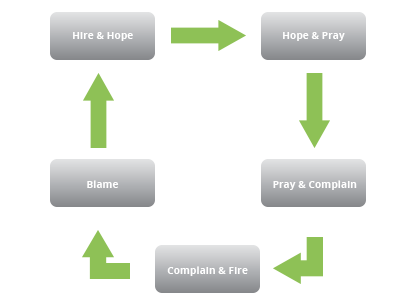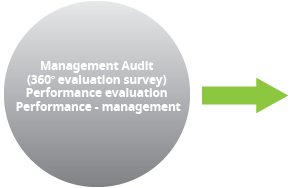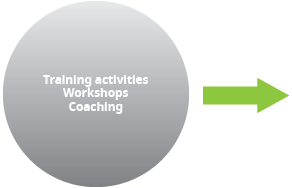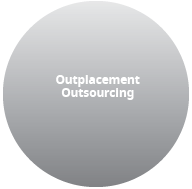Trainings and Organizational development

Strategic Planning -
Setting Company Mission and Vision
- Planning – breakthrough planning
- Setting Company Values
- Corporate activities, market opportunities and the reinterpretation of customers

Empowerment -
Leadership without Authority
- Coaching techniques
- Management techniques
- Matrix organization
- Change and crisis management

Sales management
- Sales Network Development
- Quality Headcount Development
- Methods to improve sales and prospecting

Communication
- Negotiation Techniques and Assertiveness
- Presentation Techniques
- Media Communication
- Crisis Communication

Work life balance program
- Finite and infinite games
- Self branding
- Flow – methods and possibilites

Personnel and HR consultancy
- Direct/Database Search
- Assessment Center
- Management audit (360º evaluation survey)
- Performance-management, evaluation methods
- Outplacement, outsourcing
Methodology
This very training method embraces a series of interactive group discussions and thus providing a platform for participants to do some serious thinking, look at things from different angles and express their opinions. In moderated discussions it is the key to analyze and harmonize the values and directions of participants with those of the company concerned.
During the sessions alternating individual and group work ensures and allows participants to gain in-depth knowledge of the training content.
Feedback, giving supportive coaching and corrective recommendations are of great importance when it comes to skills-development training programmes.
Strategic Planning – Defining Mission, Vision and Values of Companies
For profit oriented companies, including small and medium-sized enterprises in particular, it is a complex task, demanding a lot of endeavor in many a case, to identify their mission statement, vision and strategy. All this, sometimes, carries even the risk of failure and thus a feeling of disappointment. In our experience the majority of organizations won't take sufficient time or energy to develop their mission statement and vision, both being required for the right strategy to be in place.
Why is strategic planning so important?
- It helps organizations formulate their goals and priorities.
- It outlines their future activities
- It helps to create the essential pre-requisites to reach the desired goals
- It spurs to observe the changes of the business environment and its future influence on the organization in a conscious way
- It motivates leaders to make a decision regarding the future of their organization
According to public accounting firms, 70 percent of all strategic plans fail before being implemented. The most common reason for failure is that employees are uninformed and passive in their behavior. As a conclusion, it is imperative to involve both middle management and employees in the strategic planning process. The staff should be won over and thus sufficiently motivated to accept the necessity of the changes yet to occur, while implementing the strategy for their organization.
- How many of your employees are familiar with your organizational strategy?
- On what level do your employees get involved in formulating the long term goals for your organization?
- How do the most significant elements of the company values appear in the everyday activities of the organization?
- How do your employees react to organizational and structural changes in the company?
Empowerment
The traditional management model, in which authority lies in the hands of the hierarchically organised management that keeps their subordinates under strict control, is now getting out of date, it is clumsy and imposes a disadvantage when it comes to competition. At the same time, a new magic word appeared in leadership terminology, that is empowerment. This fashionable expression covers the type of leadership that encourages managers to share authority between them and their subordinates. The quintessence of empowerment is enrolling employees in the planning of their own work process and in making decisions that affect them. This is how employees become able to contribute, in their full capacity, to the operation of their organization. This new leadership style leads to a more efficient organization; where hierarchical differences become smaller and thus employees are more equal.
In order to put empowerment into practice, there is a need of several conditions to be in place: leaders, employees, the company culture and structure have to be open and ready for employee autonomy.
Empowerment leadership does not only depend on the managers of an organization. It may also fail due to employees' inability to act with responsibility or to their lack of capabilities required to meet increased responsibilities. Not only do they have to be ready to carry out their increased responsibilities they must also have the courage to implement them.
It is important to encourage them, and make them know that managers appreciate their positive attitude towards their expanded responsibility. The essence of empowerment is taking responsibility. Leaders themselves become employees, and vice versa.
Setting policy and guidelines remains in the hands of the management. A true leader is able to develop an extraordinary team even from average people. By 'walking-the-talk', his values and commitment the team members become able to make achievements they have never dreamt of. Talented employees will choose to stay in a workplace where they are trusted and given the chance to make independent decisions. Leaders wanting to retain their gifted people or poach the best ones from competition must learn the philosophy of empowerment first and then put it into practice.
Features of an empowerment driven organizational culture:
- Encouraging, supportive
- Allows to take risk
- Accepts mistakes
- Builds on teamwork
- Open, confidential
- Is not built on hierarchy or authority
- Relations among and between employees, superiors, inferiors are treated equal
- Clear, achievable goals
- Appraises results and achievements
- Innovative
- Encourages the flow of unobstructed information (open door policy, developing communications skills)
From the above which is true about your organization?
Sales management
Process of hiring and retaining people

In the last two years:
- How many sales reps have you hired?
- How many of them are successful?
- How much money have they lost?
- What's the ratio?
- How much time, energy has been wasted?
- What would be the optimal rate of return?
- What's missing to retain employees?
- What were the causes leading to losing employees?
Communication
Experience proves that employees' ability or rather inability to describe their emotions, express their opinions or convey their insights pose one of the biggest challenges, even for employees in the most effective organizations.
The reasons for this are as complex as the employees are themselves, and this is the core to tackle in order to surmount communication barriers. Well, it must be remembered that a multitude of companies have now realised that weak internal and external communication will slow down company growth, the employees' development and also limit the continuous improvement in quality.
Other obstacles in communication
- The absence of a creative atmosphere in which people feel free expressing their thoughts, suggestions and offer their ideas.
- We won't pay attention to what others try to tell us but just keep repeating our own ideas on and on.
- When listening to others we simply miss the emotional ingredients.
- Absence of mutual trust and respect.
- We do not appreciate other people's ideas.
- We talk too much and fail to listen enough.
- When listening we do not apply empathy.
- We fail to notice non verbal signs and signals such as facial expressions or body language.
- We think people behave the same way regardless of their personal traits.
- What sort of communications obstacles do you encounter during your everyday work?
- What are the paradigms, prejudices that make your colleagues' teamwork difficult?
- How much time do you spend repeating questions or requesting information?
Work Life Balance program
In a rushing and constantly changing world we are forced to rapidly adapt ourselves to our environment. This burdens both our body and soul, and leads to stress. Do we really feel like home in our lives? Can we always be open and honest with ourselves and with the ones surrounding us, under these circumstances?
Excessive stress and the superficial relations between people often lead to early burnout.
- Can we discover the freedom and the profound sense of fulfillment in our work?
- Is it possible to create a desirable life & work balance?
- Can we live successfully with less struggle and fight?
- Can we avoid early burnout?
The answer is YES. Our WORK LIFE BALANCE program is designed to show you the appropriate techniques and methods.
Personnel and HR Counseling
Our Integrated personnel development and HR support system was created based on our 15 years' experience gained in the fields of training and organizational development with time-tested techniques from home and abroad. Our co-operation with our clients is also featured by a particular emphasis laid on working in harmony with their HR department. We do counseling in a discreet and flexible manner with respect to the given company values and philosophy.




